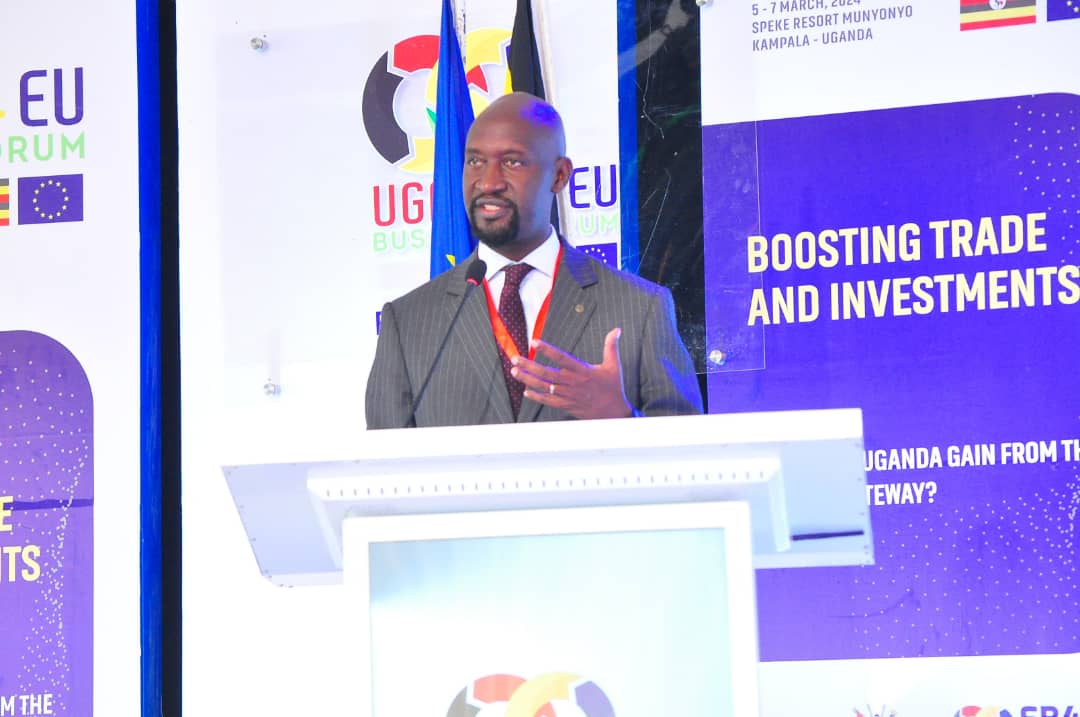The Chairman of Uganda Investment Authority, Morrison Rwakakamba, has unequivocally stated that the Ugandan government remains dedicated to fostering economic cooperation and connectivity, particularly with the European Union, despite global challenges such as geopolitical tensions and inflationary pressures.
Rwakakamba made these remarks on March 5th, 2024, while addressing the opening of the 3rd Uganda-EU Business Forum at Speke Resort Munyonyo in Kampala. The forum aims to bring together participants from Uganda and the European Union to network, learn about policy orientation, identify trade and investment opportunities, discuss challenges, develop business strategies, and establish durable partnerships to promote sustainable and inclusive growth in Uganda and Europe.
He emphasized Uganda’s proactive approach to investment, which involves implementing pro-business policies to attract investment and enhance regional trade. He believes that substantial wealth creation lies in five core areas: commercial agriculture and agro-processing, mineral value addition, tourism, manufacturing, and enabling road infrastructure.
“We encourage our EU counterparts to seize the diverse opportunities available in these areas and invest with assurance of high returns,” Rwakakamba said.
He highlighted Uganda’s membership in regional blocs such as the East African Community (EAC), the Common Market for East and Central Africa (COMESA), and the Africa Continental Free Trade Area (AfCFTA), which provide access to expanded regional markets.
Rwakakamba pointed out that with the Democratic Republic of Congo joining the East African Community Regional Market, investors can tap into a market of 92.9 million people. Furthermore, the African Continental Free Trade Area offers access to a market of over 1.3 billion people across 55 countries with a combined GDP of US$3.4 trillion.
He emphasized that Uganda is an appealing destination for Foreign Direct Investment (FDI) and remains a top recipient of FDI in the East African Community, amounting to US$3.2 billion (equivalent to 12.1 trillion Ugandan Shillings), which is crucial for investment appeal.
“Uganda and the European Union are like-minded partners with strong multifaceted relationships, and the EU remains Uganda’s key trade and investment partner, with a positive trade balance where the trade volume has reached Ugx 6.2 trillion,” he said.
Uganda’s main exports to Europe include coffee, flowers, and animals, while it imports machinery and manufactured goods. The European Union has become a leader in various sectors such as energy, agribusiness, ICT, construction, tourism, transportation, finance, legal services, and education.
Rwakakamba assured that Uganda Investment Authority takes its mandate with dedication to coordinate, encourage, promote, and facilitate investment across the country.
“To attract both domestic and foreign investors, Uganda Investment Authority offers a comprehensive array of financial, fiscal, and regulatory incentives, including 100% exemption of tax on income from agro-processing activities, access to industrial parks, and exemption from customs duty on plant and machinery for industrial development,” Rwakakamba said.
He also made it clear that for those choosing to locate in the earmarked Uganda Investment Authority Business and Industrial Parks across the country, a generous 10-year tax exemption for investments of US$50 million for foreign investors and US$10 million for domestic investors awaits.





